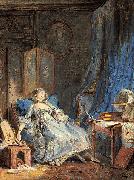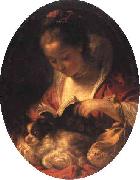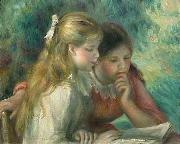
Oil On
Canvas, Real Flavor of Old Masters
|
Pierre-Antoine Baudouin
|
|||
|
|
|||
| French Painter, 1723-1769 French painter. A pupil of Francois Boucher, whose younger daughter he married in 1758, he specialized in miniatures painted in gouache, which he first exhibited at the Salon of 1761. He was received as a member of the Acad?mie Royale in 1763 with a small gouache of a historical subject, Phryne Accused of Impiety before the Areopagite (Paris, Louvre), and he later painted illustrations of biblical episodes. However, he made his name as a painter of libertine scenes in contemporary settings, which he exhibited regularly at the Salon from 1763 until 1769. Some of his work is directly inspired by Boucher's scenes of pastoral love, but the ostensibly moral themes and careful attention to detail of such paintings as the Modest Model (exh. Salon 1769; Washington, DC, N.G.A.) demonstrate that he was also influenced by Jean-Baptiste Greuze. His pictures were condemned for their immorality, both by the Archbishop of Paris, who in 1763 and 1765 ordered that works by Baudouin be withdrawn from the Salon, and also by Denis Diderot and other critics who accused him of pandering to the decadent taste of his patrons. Nevertheless, Baudouin was one of the most popular artists of the last decades of the ancien regime. | |||
|
|
|||
|
|
La Lecture new23/Pierre-Antoine Baudouin-339785.jpg Painting ID:: 68708 Visit European Gallery |
Medium Gouache on paper Dimensions cm | |
Height Width |
INS/CM |
||
|
X |
|
||
|
|
|||
|
Gabriel-Francois Doyen
|
|||
|
|
|||
| (1726 - 5 June 1806) was a French painter, who was born at Paris. His passion for art prevailed over his father's wish, and he became in his twelfth year a pupil of Charles-Andra van Loo. Making rapid progress, he obtained at twenty the Grand Prix, and in 1748 set out for Rome. He studied the works of Annibale Carracci, Pietro Berrettini da Cortona, Giulio Romano and Michelangelo, then visited Naples, Venice, Bologna and other Italian cities, and in 1755 returned to Paris. At first unappreciated and disparaged, he resolved by one grand effort to achieve a reputation, and in 1758 he exhibited his Death of Virginia. It was completely successful, and procured him admission to the Acad??mie Royale de Peinture et de Sculpture. Among his greatest works are reckoned the Miracle des Ardents, painted for the church of St Genevieve at St Roch (1767)this painting was exhibited in the salon of 1767 which was recorded by Saint-Aubin in "View of the salon of 1767"; the Triumph of Thetis, for the chapel of the Invalides; and the Death of St Louis, for the chapel of the Military School. In 1776 he was appointed professor at the Academy. Soon after the beginning of the French Revolution he accepted the invitation of Catherine II of Russia. and settled at St Petersburg, where he was loaded with honors and rewards. He died there on 5 June 1806. | |||
|
|
|||
|
|
La Lecture new24/Gabriel-Francois Doyen-935699.jpg Painting ID:: 77493 Visit European Gallery |
18th century Medium Oil on canvas Dimensions 47.5 x 32 cm cyf | |
Height Width |
INS/CM |
||
|
X |
|
||
|
|
|||
|
Pierre-Auguste Renoir
|
|||
|
|
|||
| French Impressionist Painter, 1841-1919 French painter, printmaker and sculptor. He was one of the founders and leading exponents of IMPRESSIONISM from the late 1860s, producing some of the movement's most famous images of carefree leisure. He broke with his Impressionist colleagues to exhibit at the Salon from 1878, and from c. 1884 he adopted a more linear style indebted to the Old Masters. His critical reputation has suffered from the many minor works he produced during his later years. | |||
|
|
|||
|
|
La Lecture new24/Pierre-Auguste Renoir-539389.jpg Painting ID:: 82438 Visit European Gallery |
Date 1892(1892) Medium English: Oil on canvas Dimensions English: 55 x 65,5 cm cjr | |
Height Width |
INS/CM |
||
|
X |
|
||
|
|
|||









